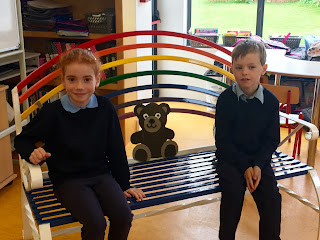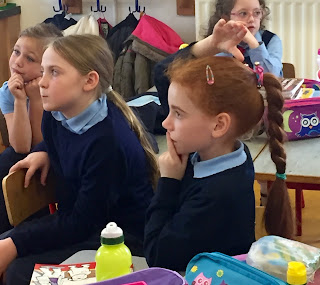We know funding can be an issue for many schools so we have devised this "Go Blue for Buddy Bench" to help raise funds for a Buddy Bench and the Buddy bench Aware programmes.
What does that mean?
It means that your school wants to become a place where children feel free, strong and comfortable in communicating how they feel to each other. The ask is that your child
Wears something blue on the designated day.
It’s their choice – jeans, jumper, club or county colours; wear a blue scarf, wear a blue bungee in their hair, they could even paint their face blue!
Donates €2
If at all possible from their own money box or does a chore because this is a child led initiative. All money raised goes towards your school’s fund for getting a Buddy Bench and the Buddy Bench Aware Programmes into your school, promoting friendship, kindness and emotional well-being for all.
How does it work?
The Buddy Bench, placed in the school yard or play area, can be used for children when they are new to the school, want to make new friends, their friends are not there on a particular day, they want to play something different from what their friends are playing, or they’re having a problem with their friends and just can’t solve it right now / want to take a break. Sitting on the bench lets everyone know you are feeling lonely, 'different', are being with your emotions and thoughts, and so others are free to check in with you and see if you're ok.
How do we know that children will understand how to use the Buddy Bench?
We don’t just leave a bench in your school yard and leave it at that. Buddy Bench Ireland will also be delivering the Buddy Bench Program in your school.
Tell me about the Buddy Bench Programme!
As well as the Buddy Bench, we deliver 3 age-appropriate workshops Little Buddies aged 3-6, Buddy Bench Aware aged 6-9 and You Are a Hero for aged 9-12+. Using a combination of story, puppet show, discussions, self-awareness techniques and role-play, our workshops teach children about feelings:
To Read More......
What they are, how they change, how to express themselves, and how to listen to others.
Through supporting core competencies of empathy, creativity, mindfulness and communication, we are empowering a generation of children to create a world where it’s OK – i.e. normal, natural, easy and fun - to express yourself.
Your child will also get a lovely Buddy Bench Activity Book with original illustrations and a comprehensive set of creative activities that teach tools for self-assessment, coping and developing language for feelings.
Wears something blue on the designated day.
It’s their choice – jeans, jumper, club or county colours; wear a blue scarf, wear a blue bungee in their hair, they could even paint their face blue!
Donates €2
If at all possible from their own money box or does a chore because this is a child led initiative. All money raised goes towards your school’s fund for getting a Buddy Bench and the Buddy Bench Aware Programmes into your school, promoting friendship, kindness and emotional well-being for all.
How does it work?
The Buddy Bench, placed in the school yard or play area, can be used for children when they are new to the school, want to make new friends, their friends are not there on a particular day, they want to play something different from what their friends are playing, or they’re having a problem with their friends and just can’t solve it right now / want to take a break. Sitting on the bench lets everyone know you are feeling lonely, 'different', are being with your emotions and thoughts, and so others are free to check in with you and see if you're ok.
How do we know that children will understand how to use the Buddy Bench?
We don’t just leave a bench in your school yard and leave it at that. Buddy Bench Ireland will also be delivering the Buddy Bench Program in your school.
Tell me about the Buddy Bench Programme!
As well as the Buddy Bench, we deliver 3 age-appropriate workshops Little Buddies aged 3-6, Buddy Bench Aware aged 6-9 and You Are a Hero for aged 9-12+. Using a combination of story, puppet show, discussions, self-awareness techniques and role-play, our workshops teach children about feelings:
To Read More......
What they are, how they change, how to express themselves, and how to listen to others.
Through supporting core competencies of empathy, creativity, mindfulness and communication, we are empowering a generation of children to create a world where it’s OK – i.e. normal, natural, easy and fun - to express yourself.
Your child will also get a lovely Buddy Bench Activity Book with original illustrations and a comprehensive set of creative activities that teach tools for self-assessment, coping and developing language for feelings.
To download the resources needed
Good Luck and we would love to see all your photos, email them us at hello@buddybench.ie there is prize !!!!!













